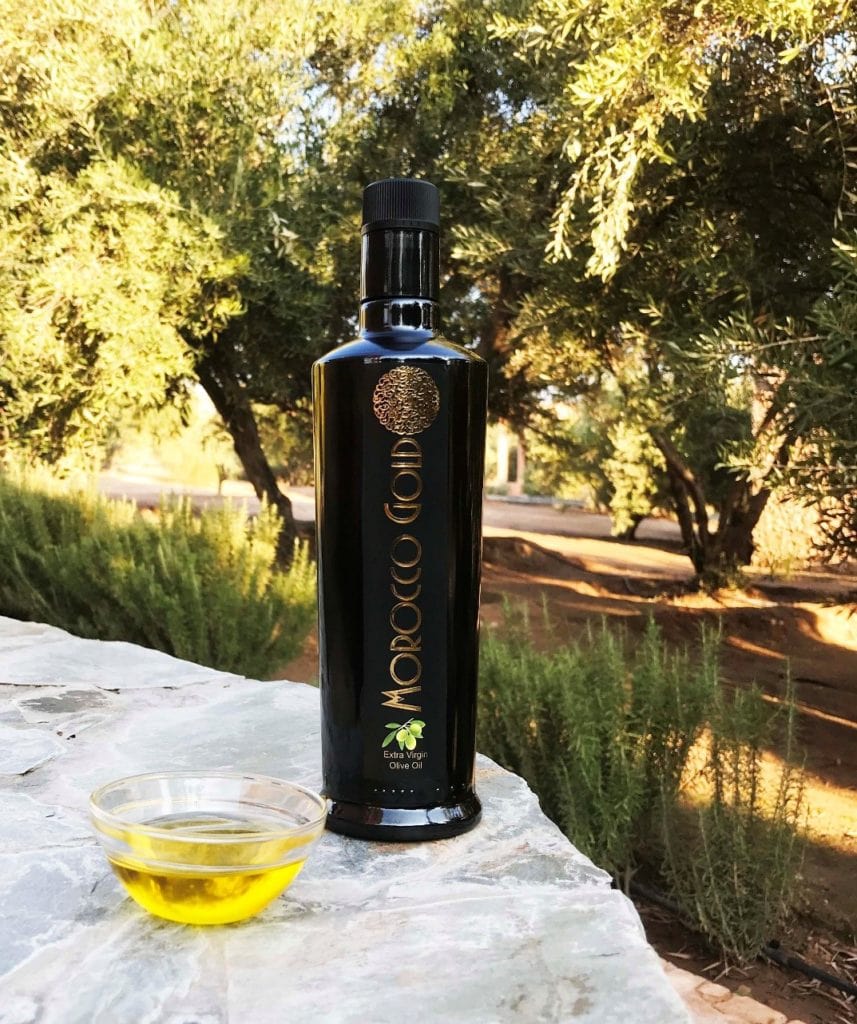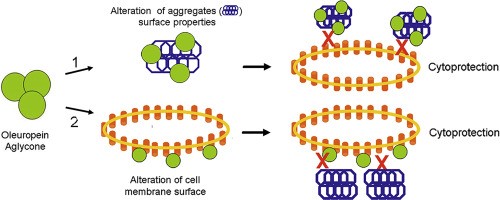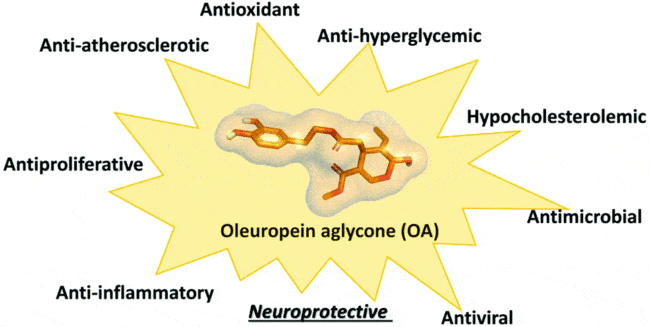How A Main Polyphenol Found In Morocco Gold Extra Virgin Olive Oil Helps To Provide The Many Health Benefits Of A Best Olive Oil
Updated May 25th 2023

Summary:
- Oleuropein Aglycone is a natural polyphenol found in high concentrations in extra virgin olive oil, especially when it is made from freshly harvested olives. It is known for its numerous health benefits and has been extensively studied for its therapeutic properties.
- It’s important to note that while oleuropein contributes to the health benefits of extra virgin olive oil, it is not the only beneficial compound present. Extra virgin olive oil also contains other polyphenols, monounsaturated fats, and vitamin E, which collectively contribute to its health-promoting properties.
Contents:
- What Is Polyphenol Oleuropein Aglycone (OA)?
- A Study Of The Effect Of Polyphenol Oleuropein Aglycone On Amyloidosis & Associated Bowel Dysfunction
- Other Biological Benefits Of Polyphenol Oleuropein Aglycone
What Is Polyphenol Oleuropein Aglycone (OA)?
Oleuropein aglycone is a glycosylated seco-iridoid, a type of bitter phenolic compound found in green olive skin, flesh, seeds, and leaves. The term oleuropein is derived from the botanical name of the olive tree, Olea Europaea. The chemical formula is :C25H32O13.
Oleuropein aglycone is one of the chief polyphenols found in extra virgin olive oil. It is getting more and more global attention within the scientific and medical communities due to its biological properties including in anti-Alzheimer’s disease, anti-breast cancer, anti-inflammatory, anti-hyperglycemic effect, and anti-oxidative properties.
OA is derived from the de-glycosylation of oleuropein that exists in the leaves and stones of the olive fruit during the maturation period and is obtained during the pressing of the olives.
A Study Of The Effect Of Polyphenol Oleuropein Aglycone On Amyloidosis & Associated Bowel Dysfunction
Amyloidosis is the name for a group of rare but serious condition caused by a build-up of an abnormal protein called amyloid in organs and tissues throughout the body. The build-up of amyloid protein deposits can make it difficult for the organs and tissues to work properly.
It had been reported that the aglycone form of oleuropein interferes with the build-up of a number of proteins associated with amyloidosis, particularly affecting neuro-degenerative diseases, preventing the growth of toxic oligomers (polymers with relatively few repeating units) and displaying protection against cognitive deterioration.
This study examined the relationships between the effects of OA on the aggregation and cell interactions of the D76N β2-microglobulin (D76N b2m) variant associated with a form of systemic amyloidosis leading to progressive bowel dysfunction, at a cellular and biophysical level.
“The results indicated that OA protection against D76N b2m cytotoxicity results from a modification of the conformational and biophysical properties of its amyloid fibrils, also a modification of the cell bilayer surface properties of exposed cells.
The study showed that OA remodels not only D76N b2m aggregates but also the cell membrane interfering with the misfolded proteins-cell membrane association, in most cases an early event triggering amyloid–mediated cytotoxicity”.
Or in simple terms, OA provides a protective barrier between health organ cells and harmful amyloid cells.

This confirms the polyphenol OA as a promising plant molecule useful against amyloid diseases.
Source: www.sciencedirect.com
Other Biological Benefits Of Polypheneol Oleuropein Aglycone
Impact Of OA Within Extra Virgin Olive Oil On Cardiovascular Health
Oleuropein has been shown to have a positive impact on cardiovascular health. It helps lower blood pressure by increasing the production of nitric oxide, which promotes vasodilation and improves blood flow. It also inhibits the oxidation of LDL (low-density lipoprotein) cholesterol, often referred to as “bad” cholesterol, and reduces the formation of blood clots, both of which contribute to atherosclerosis and heart disease.
Neuroprotective Effects Of OA Within Extra Virgin Olive Oil
Oleuropein aglycone exhibits neuroprotective properties, which means it helps protect brain cells from damage and promotes brain health. It has been shown to have anti-inflammatory and antioxidant effects in the brain, potentially reducing the risk of neurodegenerative diseases such as Alzheimer’s and Parkinson’s. Oleuropein also promotes the production of brain-derived neurotrophic factor (BDNF), a protein that supports the growth and maintenance of neurons.
Alzheimer’s disease (AD) is a high social impact disease that represents approximately 55–60% of all dementias and affects 6% of the elderly. AD is marked by cognitive degradation with a progressive impact on daily living.
Amyloid β (Aβ) deposits and oligomers are found in AD. Recently reported findings indicate that OA administration to mice can improve memory and behavioural performance by interfering with Aβ build-up. In addition, OA provides neuroprotection to cultured neuronal cells by preventing Aβ build-up, decreasing aggregate cytotoxicity, and counteracting related neuro-inflammation.
This suggests that OA administration could be regarded as a new way to prevent and cure AD.
Anti-Cancer Properties Of AO Within Extra Virgin Olive Oil
Oleuropein aglycone has demonstrated anticancer effects in various studies. It has been shown to inhibit the growth of cancer cells and induce apoptosis (programmed cell death) in different types of cancer, including breast, prostate, and colorectal cancer. Additionally, oleuropein exhibits anti-angiogenic properties, meaning it can help prevent the formation of new blood vessels that tumors need to grow and spread.
OA has been shown to be the most promising polyphenol in extra virgin olive oil in reducing breast cancer cell activity by supressing the proliferation of Human Epidermal Growth Factor Receptor2 (HER2) breast carcinoma cells.

Antioxidant and Anti-inflammatory Effects Of OA Within Extra Virgin Olive Oil
Oleuropein aglycone is a potent antioxidant, meaning it helps neutralize harmful free radicals in the body that can cause oxidative stress and damage cells. By reducing oxidative stress, oleuropein helps protect against chronic inflammation, which is associated with many chronic diseases such as heart disease, cancer, and neurodegenerative disorders.
Inflammation is a complex immune response to pathogens, damaged cells, or irritants, and enables during infection or injury. Pain from inflammation is something most people experience at some point in their lives and a common daily occurrence for many people with arthritis. OA plays an anti-inflammatory role during chronic inflammation and improves tissue damage associated with collagen-induced arthritis.
In addition, OA may be responsible for inhibiting cyclooxygenase (COX) enzymes. COX is an enzyme that forms prostanoids, prostaglandins, prostacyclins, and thromboxanes, which are all contributors to the inflammatory response. Therefore, OA can play an effective role in anti-inflammatory activities.
Anti-diabetic Effects Of OA Within Extra Virgin Olive Oil
Research suggests that oleuropein may help regulate blood sugar levels and improve insulin sensitivity. It has been shown to inhibit enzymes involved in carbohydrate metabolism and reduce glucose absorption in the intestines. These effects can be beneficial in managing diabetes and preventing complications associated with high blood sugar levels.
Pancreatic amyloid deposits of amylin are characteristic indications of type II diabetes. OA has the ability to intervene with the early stages of build-up of these deposits and hinder the cellular damage they cause.
Anti-Oxidative Effect
Oxidation of low-density lipoproteins (LDL) is deemed to increase the incidence of atherogenesis, which is a potential cause of coronary heart disease. OA was reported to protect LDL in plasma against oxidation which is considered relevant in combating atherosclerotic disease.
Source: www.frontiersin.org
This continues our series of articles about the polyphenol content of our new harvest extra virgin olive oil and what they can do to improve our health. As we have reported, this year’s harvest has produced a low acidity level of 0.2% together with the highest level of polyphenols yet seen in our extra virgin olive oil of 644 mg/kg
